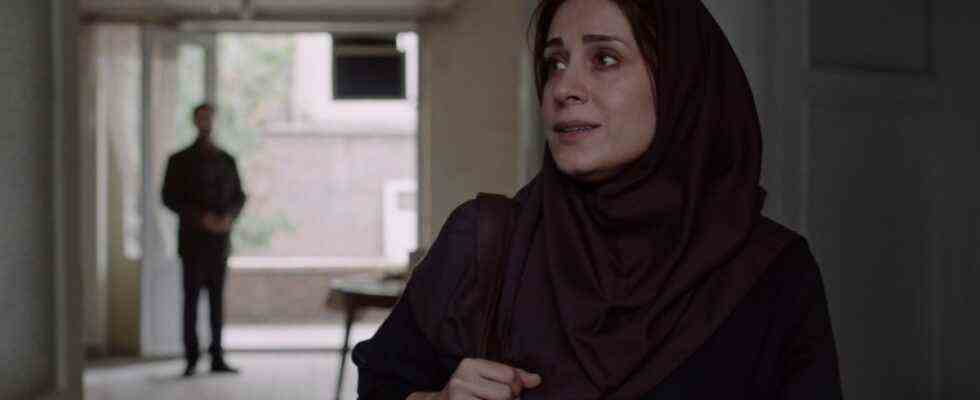The judge folds his hands over his gray file folder. “We made a mistake there,” he says in a dry official tone and with a cool face to Mina. The mistake is that Mina’s husband has already been sentenced to death. A year ago he was executed for murder. Innocent as it turns out. The Iranian state is offering compensation for this, the equivalent of around 55,000 euros for an adult man. And an untouchable formula that is always used in legal and mourning matters: “We realize that nothing can replace your husband, but what is certain is that it was God’s will.” “God’s will”, two words that are supposed to justify and comfort, but in the reflexiveness with which they are used again and again in the film, only come across as cynical.
Can you weigh a human life in money? And can an injustice ever be righted? The two Iranian filmmakers Behtash Sanaeeha and Maryam Moghaddam talk about these questions in “Ballad of the White Cow”. Mina fights in vain for a personal apology from the court. For the judiciary, the error is settled with the payment of diya, blood money.
But Mina has to live with the tragedy. At the judge’s table, she’s barely allowed an emotional breakdown. It’s a heartbreaking scene that unleashes all the young widow’s pain. In almost every other situation in her life, however, she is forced to suppress her feelings. Mina disappears on the streets of Tehran under the thick black fabric of her headscarf. Mina disappears between the milk cartons in the factory where she works to keep herself and her deaf daughter Bita afloat. Mina disappears behind her monosyllabic when pressured by her dead husband’s family. She doesn’t have more leeway in a society in which she is defenseless as a single woman. Until Reza appears at her front door and offers his help as an alleged friend of the dead man. He helps out with money, gets her a new apartment. But the man, plagued by remorse, is hiding his true identity. Reza was the judge responsible for the wrongful conviction. A cog in the state system. Now he is breaking in his guilt.
“Some take drugs, others drink, I watch Turkish series.”
The social drama was running in the competition of the Berlinale 2021. It is a haunting documentary film about the death penalty from Iran. The director duo Sanaeeha and Moghaddam – the latter also in the leading role – have made a very political film. Her view of Iranian society, the judiciary and bureaucracy is sobering. The land we see in “The Ballad of the White Cow” is a place of narrowness and emotional coldness. The film images are dense, precisely staged tableaus, always laid out in strict frames and right angles.
Lili Farhadpour and Maryam Moghaddam in “Ballad of the White Cow”.
(Photo: Amin Jafari/Weltkino)
In the everyday settings in which Mina moves, the desolate gray of the concrete dominates. Basically, all the buildings here are the same, whether courts or schools, morgues or prisons. They are large, monotonous blocks that blend into the city, shielded by walls and window grilles. The aesthetic coldness continues in the reality of life shown: Mina always has to have the same pitiless conversations in authorities and brokerage offices. As a woman without a male guardian, she is not heard in court, as a tenant, she counts as little more than a dog (considered unclean in Islam), and as a single mother, the family of her dead husband even wants to take custody of her.
The film impressively describes this struggle of a woman against an impenetrable system in which mistakes are not her fault, “God’s will” is freed from individual responsibility and cynicism seems to be the last resort. “Some take drugs, others drink, I watch Turkish series,” a neighbor once advised. “Everyone must find a way to forget.” The only resistance the film has to muster against this cynicism is Mina herself. Or more precisely: the sincere sadness and anger she repeatedly shows (if only in private). Maryam Moghaddam plays this lonely character, inspired by her own mother’s fate, with a quiet, combative dignity. Her Mina is always both at the same time: controlled and vulnerable. And you can feel the effort that means in every scene.
The fact that the filmmakers got this work past the Iranian censors into the cinemas is particularly astonishing because, in addition to the superficial social criticism, there are also small, biting provocations that appear inconspicuous for Western viewing habits, but are courageous for Iranian cinema . Mina’s daughter Bita, for example, is named after a pre-revolutionary film from which you can see short excerpts and in which women are shown without headscarves. Mina is also seen once without a headscarf – and also with red lipstick. It is a moment of emancipation on a small scale, a tiny piece of freedom.
Ghasideyeh gave sefid, Iran/France 2020 – Director and Script: Maryam Moghaddam, Behtash Sanaeeh. Camera: Amin Jafari. With: Maryam Moghaddam, Alireza Sanifar. World cinema, 105 minutes. Theatrical release: February 3, 2022.

